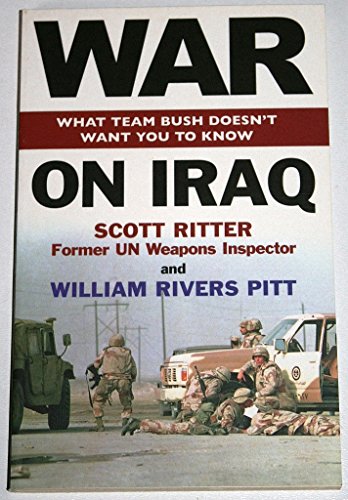The definitive debunking of the arguments for a war on Iraq - by the former weapons inspector who is currently a major voice throughout the international media and knows from the inside what the risks really are - both of not going to war and going to war. During the seven years that UN weapons inspections took place in Iraq (until they were banned in 1998), Scott Ritter and other inspectors confirmed that Saddam Hussein's chemical, biological and nuclear weapons programme had effectively been destroyed. This undermines Bush and Blair's premise for waging war on Iraq. If the weapons aren't there what is the war about? Ritter and Pitt explore the White House (and No. 10 Downing Street's) premises for war, and show the complete lack of any plausible link between Hussein and al-Qaeda. Osama Bin Laden, like Bush, has also called for the death of Saddam Hussein. Ritter and Pitt show why a forced 'regime change' is absurd and won't lead to democracy in a nation divided for centuries. And they have a bleak forecast of the possible consequences for American and British troops if there is a ground war.
War on Iraq consists of a small introduction detailing the recent history of Iraq and Western intervention in the country and then a 50-page interview with ex-weapons inspector Scott Ritter (carried out by William Rivers Pitt). It is a testament to such a small (79 pages) book that after reading it one, in some sense, feels that one has read a full and detailed account of the issues and, perhaps more importantly, a considered refutation of the excuses, exaggerations, misunderstandings and lies that make up far too much of the media froth helping to push us all into a war that Ritter, for one, thinks could be hugely dangerous. Ritter knows more about the recent history of Iraq than most anyone else having for seven years been part of the UN weapons inspectorate team that was charged with finding and destroying weapons of mass destruction inside Saddam's Iraq. This team was kicked out of Iraq when it became clear the US were indeed using the UN teams to gather intelligence.
Ritter makes it perfectly clear that his position concerning Iraq is not ideological--he is a card-carrying Republican after all and an ex-marine which immediately suggests he can not really be described as a liberal pacifist! He simply suggests that the excuses being given for the drive to war have not and can not be corroborated. This is an explosive little book and those who oppose any and all wars or those who support them would do well to see if they can respond to Ritter's challenges. --Mark Thwaite
![]()
